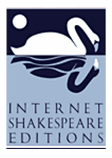Researching Shakespeare Productions

Image source: http://www.watson.org/~leigh/shakespeare.html#globe
Mo Dawley, Art and Drama Librarian
Contact Info:
Hunt Library
Art Library and Special Collections
412-268-6625
Drama Research Guide
Send Email
Shakespeare Pronouncing Dictionary (e-book)

Gary Logan. The Eloquent Shakespeare: A Pronouncing Dictionary for the Complete Dramatic Works with Notes to Untie the Modern Tongue. University of Chicago Press, 2008.
Internet Shakespeare Editions
Internet Shakespeare Editions (ISE) is an open-access, non-profit scholarly website presenting full-text Shakespeare plays and poems, Shakespeare’s life and times, and Shakespeare in performance.
RESEARCH METHODOLOGY: BEST PRACTICES
Research is rarely ever well achieved in a straight line, and often involves a good amount of intrigue! Begin as soon as possible and delve.
1. Exhaust the resources available to you as outlined in this research guide.
2. Try ALL pertinent databases for reviews and articles on your production.
3. Write down search methods and terms you use with databases (such as JSTOR) or search engines (such as Google) to minimize search replication and to keep track of your research strategies.
4. Search Cameo for critical monographs (books dedicated to discussion and criticism of a play or practitioner) such as the Harold Bloom critical series and others.
5. Search Cameo for playscripts that also contain critical/historical introductions and annotations such as the Arden Shakespeare series and others.
6. Consider familiarizing yourself with the English literature section of books containing Shakespeare plays and criticism by browsing the stacks on the 2nd floor of Hunt Library:
HUNT STACKS-2 PR2750-PR3112
Start here, but this only the English literature section. IT IS NOT THE ONLY AREA you will find information pertaining to Shakespeare and Shakespeare practioners in the library. For example, information on particular productions may be located in the PN sections. When searching the library catalog be sure to note the LOCATIONS of materials as well.
The Library of Congress Browsing Guide for the Arts may help you further.
7. Be flexible and look in a variety of resources. You may have to go back and forth from the open access web to databases and other resources when you find other information during your research that can be newly applied to your search strategies.

